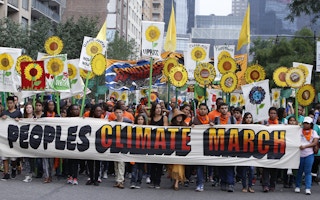When the European Union’s top foreign policy officials sit down with their Chinese counterparts in Brussels at the end of the month, investors managing trillions of dollars of assets will be watching closely.
A group of them will not be on the lookout for the latest trade deal or for signs of a shift in Beijing’s monetary policy. Instead, they will be looking for evidence of progress toward an international climate-change agreement.
Following her visit to Beijing last month, EU High Representative Federica Mogherini cited climate change as one of the major global issues on which the EU and China had agreed to work more closely together.
This December in Paris, the United Nations will convene two weeks of talks to forge a new international climate-change agreement. This agreement will supersede the 1997 Kyoto Protocol, the landmark but imperfect international treaty that first imposed mandatory reductions on the greenhouse gas emissions that are causing climate change.
There will be an agreement in Paris. The international community has been working too long, and has too much invested, for any last-minute failure. What is less certain is whether the agreement will be sufficiently ambitious to head off the worst effects of global warming.
Only the EU and a handful of states have so far published their planned contributions to the global effort. While there are some encouraging signs, the plans will almost certainly fall short of putting the world on the pathway to limiting the rise in global temperatures to 2 C.
Valuing safety
Investors are profoundly concerned about the success of the Paris talks and reaching an international agreement that offers a realistic chance of tackling climate change. They are collectively investing trillions of dollars, in many cases on behalf of beneficiaries who will be relying on them for financial security for decades into the future. These investors want to ensure that rising sea levels, extreme weather events, megadroughts and catastrophic floods do not imperil the value of the assets they invest in.
There are more immediate concerns. Efforts to reduce greenhouse gases, whether by pricing carbon emissions, incentivizing renewables or promoting energy efficiency, will impose profound changes on the global economy. Some high-emitting companies and assets will see their market value decline; low-carbon sectors will grow rapidly. Investors want to understand how policymakers plan to encourage the move to a low-carbon economy, so they can begin to invest accordingly.
Our investors understand that it is not a question of whether this low-carbon transition will take place, but when, how quickly and with how much disruption.
Climate science is not without its uncertainties. The exact effects of our unprecedented emissions of greenhouse gases on global temperatures and weather patterns around the world cannot be forecast. But what is certain is the direction of travel and that action must be taken to dramatically reduce these emissions. The only question is whether that action is taken soon, allowing time to shift investments, or whether it is delayed, and then rushed as the worst effects of climate change make themselves felt.
Give us a signal
So what are investors looking for from the EU-China summit? Both sides have shown themselves committed to take action on climate change, and cooperation between the EU and China on the issue goes back many years. Our members would like to see that cooperation redoubled, with clear support from the two sides for an ambitious outcome at the Paris talks, and a commitment to steering investment decisions made by the governments and their respective companies.
We would echo the calls made by 120 investor chief executives last month to Group of Seven finance ministers. Those CEOs, representing $12 trillion in assets, urged the G-7 to push for a long-term global emissions reduction goal as part of an international climate agreement. Such a goal would provide evidence of high-level political commitment to tackling climate change, offering the long-term context within which investments can be made.
They also called for the publication of short- to medium-term national emissions pledges and country-level action plans. Such plans offer the actionable detail that guide actual investment decisions.
The summit also offers opportunities specific to the EU-China partnership. For example, EU members including France, Germany, Italy and the U.K. are prospective founders of the Asian Infrastructure Investment Bank. If action against climate change could be embedded into the bank’s mandate, it could help to channel billions of dollars toward reducing emissions in the fastest-growing part of the world and could help make Asia more resilient to the effects of climate change.
Cooperation on the AIIB is just the latest sign of the growing importance to global finance and economics of the EU-China relationship. Our members in the EU and beyond are investing heavily in China’s economy. In turn, Chinese institutions are becoming increasingly active investors in Europe’s infrastructure.
Investors in both the EU and China need clear and concrete signals that their political leaders are serious about tackling the world’s most pressing environmental problem so they can begin making the investments so urgently required.
Jessica Robinson is CEO of the Association for Sustainable & Responsible Investment in Asia, a Hong Kong-based think tank promoting sustainable finance in the region. This op-ed was first published in the Nikkei Asian Review.

















